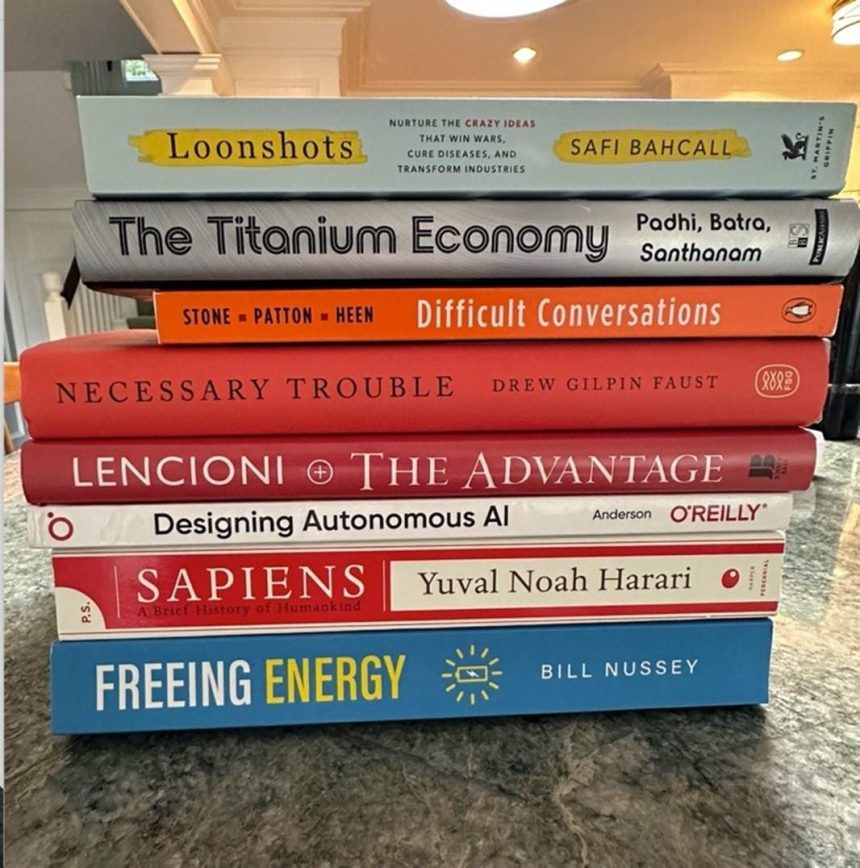First off, a heartfelt thank you to Safi Bahcall, the team at McKinsey, Bill Nussey, the great Yuval, Noah Harari, a great book about designing autonomous AI from Kence Anderson, two books on corporate culture, and one from the first woman president of Harvard. Labor Day marks the end of summer learnings, and hopefully, your books inspired you. I have to own up that I am only halfway through “Necessary Trouble,” from the great Harvard historian and its first female President, Drew Gilpin Faust (go and buy it).
We are living through history: the explosion of AI’s relevance, global trade tensions, social divides that are uncomfortably clear with large populations in either homeless situations or barely able to feed themselves. One in eight Americans lives on food stamps. To bring this home, if you stood in an elevator with eight other people, statistically, one is likely to be on food stamps. We are, as managers, employees, and employers, in the most unpredictable battle of all time. The whole BTO (back to office) challenge. This was the hottest summer in the world’s history. Dr. Jeff Arnold of Mitre, his podcast, “Is it hot enough,” talked through a seven-step model for corporate responsibility for decarbonization.
Our economies are rapidly evolving with AI, edge intelligence, agile digital in everything, and an increasing aspiration to have machines do base work for us, like autonomous vehicles. Just look at my podcast with Jesse Levinson, the CTO of Zoox’s here on Forbes.
These summer books inspired me in four connected ways as we live through these times.
We need to get uncomfortable with history to drive change
AI is a pen’s down moment, so is poverty and the energy needs of the planet. As leaders, we get to make choices; we have significant channels for communication, resources, and business capabilities that are being driven by these larger forces but are also at hand for us to change and manage. The way we think about energy usage in our office spaces, how we can whiteboard easy and immediate ways to use AI in any area of work from HR to marketing, engineering, finance, sales, even facilities management. “Necessary Trouble,” from the great Harvard historian and its first female President, Drew Gilpin Faust, lays out a great life story in how very small acts of courage make a remarkable difference in creating one’s legacy. For those who sometimes hold back, to not be uncomfortable, this book is an inspiration in action.
The future of climate is not going to be a new pattern but a series of wildly changing scenarios. Just ask the attendees of this year’s Burning Man festival in Nevada, where rain and flooding have prevailed.
Our history shows that we can handle anything if we lean in. Yuval Noah Harari’s book , “Sapiens” just illustrates this time and time again. Nobody likes to have difficult conversations, especially around areas of back to office work (just ask Andy Jassy, the CEO of Amazon), but they happen and should happen more as we have to navigate through periods of seismic shift.
“Difficult Conversations” is a simple two-day read and was really the first time I had seen a clear process for how these conversations can be made to be hyper-productive.
We are entering a new economic era. You may have never heard of these companies, but start making more exotic bets
The McKinsey partner book, “The Titanium Economy,” describes thirty-plus companies changing the future landscape in the US. It’s too easy to say the industrial giants of the last forty years will be the industrial giants of the next ten or even twenty years. By 2026, the average length of stay on the Fortune 500 list will have shrunk from twenty years to fourteen years (citation). Imagine that rate of change continues to accelerate and get shorter and shorter.
By 2032, that means less than 10% that were there at the turn of the 21st Century would still be there. Now is the time to make more, what appear exotic bets in these leaders of the next decade and beyond. Creative destruction is here to stay.
Try, try, try again and adjust along the way. Nurture these “Loon Shots”
I was lucky enough to interview Safi Bahcall, the author of “Loonshots” in 2019 for Forbes. If one theme kept coming back over the summer from these reads, it’s the issue that Loonshot ideas are never right the first, second, or maybe even the third time but need to be nurtured for success through that process. The constant management of signals is a vital ingredient for progressive learning and has to be a conscious part of the process to nurture greatness. Bill Nussey’s book, “Freeing Energy,” again another quest on the Forbes Futures in Focus Podcast, really illustrates that nurturing loon shots ideas as we struggle to re-engineer how we create, manage, and consume energy in a whole new way. Just look at how easy it is to get a solar panel system ordered and put in in Australia (a few weeks) versus months and months in the US. We need to take better care to nurture loon shots as they may well be a vital part of our economic and societal future. Lencioni’s book on organizational health, “The Advantage,” lays out a great process for this type of thoughtful nurturing that could easily be applied to any of the big challenges companies face going into the next ten years.
Do not be afraid of AI or autonomous AI. Kence Anderson is right
It just so happens that I was able to interview the President of O’Reilly Media as I was reading this book. It’s a simple framework for the development of one of the most powerful tools at our disposal. It opened my eyes to the possibilities ahead of me as well as the incredible interest in the work and undergraduate Texas A&M Geo-sciences, Hannah Ward did for me over the summer. AI is a tool; it’s an uncomfortable conversation, but one we need to have. Nearly one-quarter of a million people were curious enough to find out how. If you need any inspiration heading into 2024 planning, every one of these books should offer guidance, light, and great metaphors for what lies ahead. I hope your summers and your Labor inspire you.
Read the full article here









